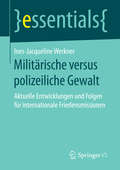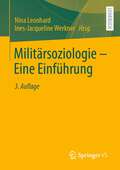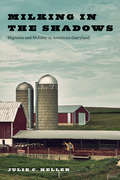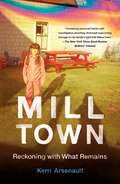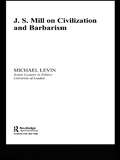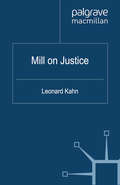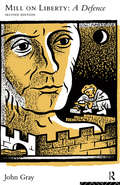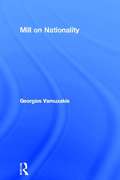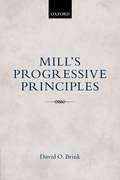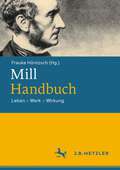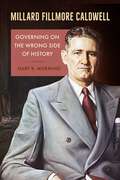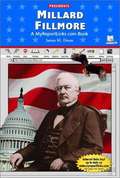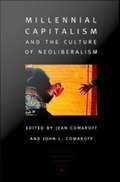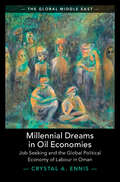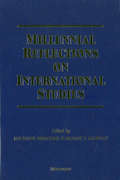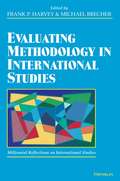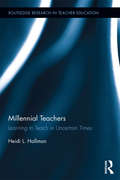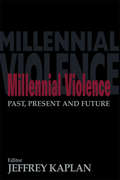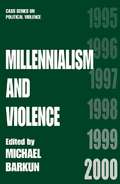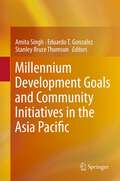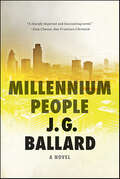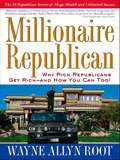- Table View
- List View
Militärische versus polizeiliche Gewalt: Aktuelle Entwicklungen und Folgen für internationale Friedensmissionen (essentials)
by Ines-Jacqueline WerknerInes-Jacqueline Werkner verhandelt in diesem essential die Frage der kategorialen Unterscheidung militärischer und polizeilicher Gewaltanwendung und deren Folgen für internationale Friedensmissionen. Sie greift damit einen in friedensethischen Debatten zunehmend diskutierten Punkt auf, nämlich welchen Beitrag Polizeikräfte zur Konfliktbearbeitung und internationalen Rechtsdurchsetzung leisten können. Im Fokus dieser Überlegungen steht das Ziel der Gewaltdeeskalation. So würden sich Polizeieinheiten aufgrund ihres Aufgabenprofils und ihrer Ausstattung deutlich vom Militär unterscheiden. Diese Annahmen, aber auch der zugrundeliegende Begriff der Gewalt und die rechtlichen Rahmenbedingungen werden in diesem essential erörtert.
Militärsoziologie – Eine Einführung
by Ines-Jacqueline Werkner Nina LeonhardDas Buch bietet eine Einführung in das Forschungsgebiet der Militärsoziologie. Es richtet sich an Studierende, aber auch an interessierte Wissenschaftlerinnen und Wissenschaftler, die sich einen Überblick über die aktuelle sozialwissenschaftliche Forschung zum Militär verschaffen wollen. Da sich mit dem Gegenstand "Militär" unterschiedliche Fachdisziplinen beschäftigen, sind die Beiträge interdisziplinär ausgerichtet. In verschiedenen Kapiteln werden zentrale Themen und Fragestellungen vorgestellt und an empirischen Beispielen diskutiert.
Milking in the Shadows: Migrants and Mobility in America’s Dairyland (Inequality at Work: Perspectives on Race, Gender, Class, and Labor)
by Julie C. KellerMigrant workers live in a transnational world that spans the boundaries of nation-states. Yet for undocumented workers, this world is complicated by inflexible immigration policies and the ever-present threat of enforcement. Workers labeled as “illegals” wrestle with restrictive immigration policies, evading border patrol and local police as they risk their lives to achieve economic stability for their families. For this group of workers, whose lives in the U.S. are largely defined by their tenuous legal status, the sacrifices they make to get ahead entail long periods of waiting, extended separation from family, and above all, tremendous uncertainty around a freedom that many of us take for granted—everyday mobility. In Milking in the Shadows, Julie Keller takes an in-depth look at a population of undocumented migrants working in the American dairy industry to understand the components of this labor system. This book offers a framework for understanding the disjuncture between the labor desired by employers and life as an undocumented worker in America today.
Mill Town: Reckoning with What Remains
by Kerri ArsenaultA galvanizing and powerful debut, Mill Town is an American story, a human predicament, and a moral wake-up call that asks: what are we willing to tolerate and whose lives are we willing to sacrifice for our own survival?Kerri Arsenault grew up in the rural working class town of Mexico, Maine. For over 100 years the community orbited around a paper mill that employs most townspeople, including three generations of Arsenault’s own family. Years after she moved away, Arsenault realized the price she paid for her seemingly secure childhood. The mill, while providing livelihoods for nearly everyone, also contributed to the destruction of the environment and the decline of the town’s economic, physical, and emotional health in a slow-moving catastrophe, earning the area the nickname “Cancer Valley.”Mill Town is a personal investigation, where Arsenault sifts through historical archives and scientific reports, talks to family and neighbors, and examines her own childhood to illuminate the rise and collapse of the working-class, the hazards of loving and leaving home, and the ambiguous nature of toxins and disease. Mill Town is a moral wake-up call that asks, Whose lives are we willing to sacrifice for our own survival?
Mill on Civilization and Barbarism
by Michael LevinJohn Stuart Mill's best-known work is On Liberty (1859). In it he declared that Western society was in danger of coming to a standstill. To understand how Mill came to this conclusion requires one to investigate his notion of the stages from barbarism to civilisation, and also his belief in imperialism as part of the civilising process. This study encompasses discourses on the blessings, curses and dangers of modernisation from approximately the time of the American and French revolutions to that of the so-called mid-Victorian calm in which On Liberty was written. Current political issues concerning the West and Islamic countries have heightened interest in just the kind of question that this book discusses: that of how the West relates to, and assesses, the rest of the world.
Mill on Justice (Philosophers in Depth)
by L. KahnJohn Stuart Mill was one of the most important figures in political philosophy but little has been published on his ideas on justice. This impressive collection by renowned Mill scholars addresses this gap in Mill studies and theories of justice.
Mill on Liberty: A Defence
by John GrayMill on Liberty was first published in 1983 and has become a classic of Mill commentary. The second edition reproduces the text of the first in full, and in paperback for the first time. To this, John Gray adds an extensive postscript which defends the interpretation of Mill set out in the first edition, but develops radical criticisms of the substance of Millian and other liberalism.The new edition is intended as a contribution to the current debate about the foundations of liberalism, and it looks closely at the recent seminal contributions to liberal thought by Raz, Feinberg, Rawls and Berlin. Central to its argument is Gray's contention that, like other liberalisms that ground themselves on an ideal of autonomy or individuality, Millian liberalism has a Eurocentric bias that cannot be given rational justification. Gray addresses the question of whether any form of liberal theory, can, in fact, avoid the bias, and concludes that it cannot.This book will be indispensable both to those familiar with On Liberty and to those coming to it for the first time. In addition, the book will also be of great interest to moral and political theorists, to students of law and jurisprudence and to intellectual historians.
Mill on Nationality (Routledge/PSA Political Studies Series)
by Georgios VarouxakisJohn Stuart Mill's thought has been central in recent (as well as older) works of political theory discussing the relationship between liberal democratic politics and nationality or nationalism -- which is far from surprising, given his undisputed influence on liberal attitudes towards nationality from the 1860s to the present. This book provides the first thorough critical study of the attitude of this pillar of the liberal tradition towards nationality, nationhood, patriotism, cosmopolitanism, intervention/non-intervention, and international politics more generally. Based on exhaustive research in a great range or writings by Mill, as well as by his contemporaries and later students, it establishes for the first time clearly and subtly where exactly Mill stood with regard to nationhood, nationalism, patriotism, cosmopolitanism, national self-determination, intervention/non-intervention and other important issues in international ethics. It thus exposes and challenges all sorts of misconceptions, half-truths, or myths surrounding Mill's views on, and attitude towards, nationality and related issues in a vast literature from the mid-nineteenth to the beginning of the twenty-first century. At the same time, it offers a timely contribution to contemporary debates among political theorists on the relationship between liberal democratic values and nationalism, patriotism and cosmopolitanism, not least through its articulation of a distinct sense in which patriotism and cosmopolitanism can be compatible and mutually reinforcing (based on Varouxakis's interpretation of Mill's thought on this question). The reader will find critical discussions of the pronouncements on some of the issues examined (or on Mill's contributions to them) of some of the most important late-twentieth-century political theorists as well as of contemporaries or near-contemporaries of Mill.
Mill's Progressive Principles
by David O. BrinkIn Mill's Progressive Principles David Brink provides a systematic reconstruction and assessment of John Stuart Mill's contributions to the utilitarian and liberal traditions, examining his first principles and their application to issues of representative democracy and sexual equality. Brink defends novel interpretations of key elements in Mill's moral and political philosophy, including his concepts of motivation, happiness, duty, proof, harm and the harm principle, freedom of expression, anti-paternalism, representative democracy and weighted voting, and sexual equality. However, the most distinctive aspect of this account of Mill's commitments is the case it makes for a perfectionist reading of his conception of happiness and the significance this has for other aspects of his moral and political philosophy. On this perfectionist conception, the chief ingredients of happiness involve the exercise of a person's capacities for practical deliberation and decision that mark us as progressive beings. Once this perfectionist theme is made explicit, it can be shown to be central to Mill's views about utilitarianism, liberalism, rights, democratic government, and sexual equality.
Mill-Handbuch: Leben – Werk – Wirkung
by Frauke HöntzschJohn Stuart Mill (1806–1873) gehört im angelsächsischen Raum seit jeher zu den Klassikern der Ideengeschichte. Aber auch im deutschsprachigen Raum wird er immer stärker rezipiert: Viele seiner Hauptschriften wurden neu editiert, sein Denken erfreut sich über die disziplinären Grenzen hinweg bis hinein in die Feuilletons wachsender Aufmerksamkeit. Das liegt nicht zuletzt an Mills ungewöhnlich undogmatischer Denkhaltung, die sich in der Berücksichtigung und Synthese verschiedenster Denkrichtungen niederschlägt. Seine Schriften zeugen von einem differenzierten Blick auf gesellschaftspolitische Zusammenhänge, was sie auch für moderne Debatten vielfältig anschlussfähig macht. Das Handbuch stellt John Stuart Mills Leben, die wichtigsten Einflüsse auf sein Denken, sein Werk und die zentralen Konzepte sowie die Rezeption seines Denkens im Rahmen unterschiedlicher Diskurse vor.
Millard Fillmore Caldwell: Governing on the Wrong Side of History (Florida in Focus)
by Gary R. MorminoWhen actions of the past clash with the values of today Millard Fillmore Caldwell (1897–1984) was once considered one of the greatest Floridians of his generation. Yet today he is known for his inability to adjust to the racial progress of the modern world. In this biography, leading Florida historian Gary Mormino tackles the difficult question of how to remember yesterday’s heroes who are now known to have had serious flaws.The last Florida governor born in the nineteenth century and the first to govern in the atomic age, Caldwell was beloved in his time for leading the state through the hard years of World War II. He was wildly successful in a political career that may never be matched, serving as governor, congressman, state legislator, and chief justice of the Florida Supreme Court. He passed important educational reform legislation. But his attitudes toward race and citizenship strike Americans today as embarrassing and shocking. He refused to address black leaders by their titles. He argued for segregated bomb shelters. And he accepted lynching as part of the southern way of life.Mormino measures the contributions of Caldwell alongside his glaring faults, discussing his complicated role in shaping modern Florida. In the current debates surrounding public memorials and historical memory in the United States, Millard Fillmore Caldwell is a timely example of one man’s contested legacy. A volume in the series Florida in Focus, edited by Andrew K. Frank
Millard Fillmore: A MyReportLinks.com Book
by James M. Deem- Covers the lives, accomplishments, and political careers of the American presidents. - Pre-evaluated Report Links back up each book.
Millennial Capitalism and the Culture of Neoliberalism
by Dilip Parameshwar GaonkarThe essays in Millennial Capitalism and the Culture of Neoliberalism pose a series of related questions: How are we to understand capitalism at the millennium? Is it a singular or polythetic creature? What are we to make of the culture of neoliberalism that appears to accompany it, taking on simultaneously local and translocal forms? To what extent does it make sense to describe the present juncture in world history as an "age of revolution," one not unlike 1789-1848 in its transformative potential? In exploring the material and cultural dimensions of the Age of Millennial Capitalism, the contributors interrogate the so-called crisis of the nation-state, how the triumph of the free market obscures rising tides of violence and cultures of exclusion, and the growth of new forms of identity politics. The collection also investigates the tendency of neoliberal capitalism to produce a world of increasing differences in wealth, environmental catastrophes, heightened flows of people and value across space and time, moral panics and social impossibilities, bitter generational antagonisms and gender conflicts, invisible class distinction, and "pariah" forms of economic activity. In the process, the volume opens up an empirically grounded, conceptual discussion about the world-at-large at a particularly momentous historical time--when the social sciences and humanities are in danger of ceding intellectual initiative to the masters of the market and the media. In addition to its crossdisciplinary essays, Millennial Capitalism and the Culture of Neoliberalism--originally the third installment of the journal Public Culture's "Millennial Quartet"--features several photographic essays. The book will interest anthropologists, political geographers, economists, sociologists, and political theorists. Contributors. Scott Bradwell, Jean Comaroff, John L. Comaroff, Fernando Coronil, Peter Geschiere, David Harvey, Luiz Paulo Lima, Caitrin Lynch, Rosalind C. Morris, David G. Nicholls, Francis Nyamnjoh, Elizabeth A. Povinelli, Paul Ryer, Allan Sekula, Irene Stengs, Michael Storper, Seamus Walsh, Robert P. Weller, Hylton White, Melissa W. Wright, Jeffrey A. Zimmerman
Millennial Dreams in Oil Economies: Job Seeking and the Global Political Economy of Labour in Oman (The Global Middle East)
by Crystal A. EnnisThis book shifts the analysis of economic development in Oman from the traditional focus on oil to the perspective of labour. Focusing on the experiences of workers, jobseekers, and the governance of labour markets, Crystal A. Ennis offers a fresh perspective on regional development and rentier neoliberalism in the Gulf. Highlighting Oman's position within global capitalism, Ennis makes a compelling case for de-exceptionalising the Gulf, arguing that the region's labour markets are global and subject to similar pressures as other global economies. Moving beyond oil also allows Ennis to focus on the social conditions of Oman, where over sixty four percent of the population are under the age of thirty. Ennis offers a rich analysis of historical lineages of labour governance, class formation; and, following protests after 2011 as youth unemployment soared in the region, how authoritarian states react to public pressure and social unrest around perceived economic decline.
Millennial Reflections on International Studies
by Frank P. Harvey Michael BrecherForty-five prominent scholars engage in self-critical, state-of-the-art reflection on international studies to stimulate debates about successes and failures and to address the larger question of progress in the discipline. Written especially for the collection, these essays are in hardcover in the form of an easy-to-use handbook, and in paperback as a number of separate titles, each of which consists of a particular thematic cluster to merge with the range of topics taught in undergraduate and graduate courses in international studies. The themes addressed are realism, institutionalism, critical perspectives, feminist theory and gender studies, methodology (formal modeling, quantitative, and qualitative), foreign policy analysis, international security and peace studies, and international political economy. This collection provides an accessible and wide-ranging survey of the issues in the field as well as an invaluable bibliography, and will undoubtedly determine the shape of future research in international studies for the millennium.
Millennial Reflections on International Studies: Evaluating Methodology in International Studies
by Frank P. Harvey Michael BrecherEvaluating Methodology in International Studies offers a unique collection of original essays by world-renowned political scientists. The essays address the state of the discipline in regard to the methodology of researching global politics, focusing in particular on formal modeling, quantitative methods, and qualitative approaches in International Studies. The authors reflect on the strengths and weaknesses of current methodology and suggest ways to advance theory and research in International Studies. This volume is essential reading for methods courses and will be of interest to scholars and students alike. - See more at: http://www.press.umich.edu/8887#sthash.xcHJ81Hc.dpuf
Millennial Teachers: Learning to Teach in Uncertain Times (Routledge Research in Teacher Education #11)
by Heidi L. HallmanDrawing on narratives of five beginning teachers, Millennial Teachers explores the tensions in teachers’ young careers and how changing social, economic, and technological conditions of our current era both afford and constrain teachers’ identities and in contexts in which they work. Examining case studies of beginning teachers, Hallman draws a generational portraits of novice teachers and identifies the challenges inherent in transitioning from pre-service teacher to in-service teacher. This book synthesizes these teachers’ views on a range of topics and provides an understanding of the evolving pressures and possibilities of future teachers of the "millennial" generation.
Millennial Violence: Past, Present and Future (Political Violence Ser.)
by Jeffrey KaplanThis volume encompasses an array of material exploring the millennium phenomenon and the violent excitement it provokes. Consisting of three core parts, the book combines pertinent documents with insightful commentary and discussion.
Millennialism and Violence
by Michael BarkunAs the world approaches the year 2000, many societies are experiencing an unprecedented growth in millenarian movements that anticipate an imminent and total transformation of the world. Many of these movements have been associated with violence, either as a means for producing change or as a response to confrontations with state authority. This book draws together research on this topic from political science, psychology, sociology and history in an attempt to understand the relationship between millenarian movements and episodes of violence.
Millennium (Kinsman #2)
by Ben BovaThe second book of "The Kinsman Saga", which also includes "Kinsman" and "Colony". The story of a man driven to create the future, and forced to save two worlds from the death throes of the millennium. Other science fiction titles by the author include "Orion" and "Voyagers".
Millennium Development Goals and Community Initiatives in the Asia Pacific
by Amita Singh Eduardo T. Gonzalez Stanley Bruce ThomsonThe book brings together implementation studies from the Asia Pacific countries in the context of the deadline of 2015 for achieving the Millennium Development Goals. The contributors to this volume are scholars belonging to the Network of Asia Pacific Schools and Institutes of Public Administration and Governance (NAPSIPAG). NAPSIPAG is the only non-West governance research network presently located at Jawaharlal Nehru University, New Delhi after having shifted from its original location at INTAN (Government of Malaysia) at Kuala Lumpur in 2009. 'Implementation' is a less understood but a much debated area of governance research. It requires micro-level analysis of government agencies, service delivery departments and stakeholders on one hand and its national and global policy level connections on the other. Implementation studies are above disciplinary divides and subsequent disjunctions which inhibit explorations on policy downslides or failures. The studies relate to the new initiatives which governments across the region have undertaken to reach out to the MDG targets agreed upon in 2000. The focus of analysis is the policy framework, local capacities of both the government agencies and people in drawing partnerships with relevant expert groups, ability to bring transparency and accountability measures in transactions for cost-effective results, leadership and sustainability dimensions which influence the functioning of local agencies. The book is especially important in the background of 15 voluminous Administrative Reforms Commission Reports accumulating dust in India and similar efforts lying unattended in many other countries of this region as well. Countries like Malaysia, which has focused upon 'implementation strategies' combined with timely evaluation and supervision of administrative agencies has almost achieved most of their committed MDGs. A special report of Malaysian efforts, initiates the debate of moving beyond the 'best practice research' in implementation arena. The central idea of this book is to demonstrate the role of communities in making governance effective and government responsive to the needs of people.
Millennium People: A Novel
by J. G. Ballard"The most cosmically elegiac writer in literature . . . no one reading Ballard could doubt the tidal gravity of his intellect." —Jonathan Lethem, New York Times Book Review Violent rebellion comes to London’s middle classes in this “fascinating” (San Francisco Chronicle) novel from the same author of Crash and Empire of the Sun. Never more timely, Millennium People “seeks to illuminate our hearts of darkness while undermining our assumptions about what literature is meant to do” (Los Angeles Times).
Millie's Book
by Barbara BushFrom the Book jacket: First Dog Millie Bush's memoir is a heartwarming look at one dog's life as Presidential best friend. Told with the characteristic modesty associated with Ms. Millie Bush, Millie's Book chronicles a very popular administration from the dog days of the August 19 8 8 Presidential campaign to the dog's heaven of a Camp David hiatus. For the first time, Millie recounts her occasionally circuitous path to the White House, from her arrival in Washington in 1987, through the sometimes lonely days of the campaign, to her establishment of residency at 1600 Pennsylvania Avenue, and the birth of her six offspring in March 1989 on its second floor. Millie also takes readers through a typically busy day with the President that begins at 6:00 A.M. and includes morning briefings, deliberations in the Oval Office, with occasional short breaks for squirrel hunting. Shunning hounding media attentionshe's a spaniel -Millie also accompanies the First Lady on a tour of the White House from the Rose Garden to the Lincoln Bed room; from the East Room-to the Blue Room. And subtly enlisting her broadening social pedigree, Mille talks about her many friends, who include Gerald Ford, the Jordanian Royal Family, Margaret Thatcher, Clark Clifford, Bjorn Borg, Audrey Hepburn, Sam Donaldson, Billy Graham, and Helen Thomas. Celebrated on the cover of Life, kidded in the pages of Washingtonian magazine, Millie Bush has continued to gain the attention of the nation. Now Millie's Book presents an authorized account not only of the Bushes' White House but also of their home. It was, by the way, helped enormously by the hard work and patience of Barbara Bush. Mildred Kerr Bush lives at the White House, Camp David, and Kennebunkport, Maine.
Millionaire Republican
by Root Wayne AllynThe eighteen master secrets to creating personal wealth in the Republican-dominated era.
Millionaire Republican
by Wayne Allyn RootAmerica's leading professional prognosticator and a successful Millionaire Republican himself reveals the eighteen keys to creating wealth in the GOP-dominated era.
